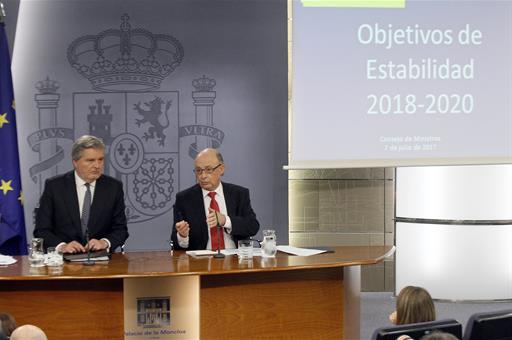Council of Ministers
Government completes 2017 Public Employment Offer with 20,280 new vacancies
Council of Ministers - 2017.7.7
Moncloa Palace, Madrid
The Council of Ministers approved the Royal Decree on the Public Employment Offer of the General State Administration for 2017, which amounts to 15,998 vacancies, as well as a Royal Decree-Law for an Extraordinary Offer in the fight against fraud and to improve public services, with an additional 4,282 vacancies.
The Public Employment Offer for this year also includes the 7,969 vacancies under the Royal Decree Law of 31 March that approved the offer for teaching staff, the armed forces, the national and regional police and the Guardia Civil. In total, 28,249 posts - the highest figure since the year 2008 - divided into 20,451 open vacancies and 7,798 through internal promotion.
The Minister for the Treasury and Public Function, Cristóbal Montoro, explained that this offer allows those sectors established as a priority in the General State Budget for 2017 to be catered for, which maintain a replacement rate of 100%, while the other sectors have a replacement rate of 50%. Three more sectors have been included in this priority action to those considered as such in recent years: public service customer care, the direct provision of public transport service, and security and emergencies.
The Public Employment Offer for 2017 comes as a result of negotiations with the trade unions and the agreement to reduce temporary employment in this area, highlighted Cristóbal Montoro. "This also provides value to the actual content of the offer", he stated, "because we are not only talking about the number of vacancies, but also the quality of the posts on offer and, above all, that which represents having fluid social dialogue with the trade unions in relation to the Public Function".
Commitment to Public Function
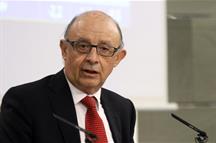 Pool Moncloa/J.M. CuadradoThe Minister for the Treasury highlighted the contrast between the offer in 2017 and that of those years with the greatest adjustments during the crisis, which, for example, did not even amount to 3,000 vacancies in 2012. Consequently, the number of State public servants has fallen since the maximum in 2010, and in the first quarter of 2017 it stood under the 3-million mark.
Pool Moncloa/J.M. CuadradoThe Minister for the Treasury highlighted the contrast between the offer in 2017 and that of those years with the greatest adjustments during the crisis, which, for example, did not even amount to 3,000 vacancies in 2012. Consequently, the number of State public servants has fallen since the maximum in 2010, and in the first quarter of 2017 it stood under the 3-million mark.
Cristóbal Montoro argued that "it is not a question of returning to the past, but rather of having the best and most highly qualified public servants to provide the present and future public services". This is a question not only of offering public positions but also of assigning them to priority areas.
The minister thanked the public servants for their commitment and the "extraordinary effort" they have made during the crisis. "Now that the economic recovery is a reality and we are seeing growing evidence of, it is also time to commit to the Public Function and its development", he claimed.
Distribution of vacancies
In the breakdown of the ordinary Public Offer, Cristóbal Montoro remarked that the vacancies are distributed between the General State Administration, the System of Justice and public servants working for local authorities with a national qualification, "a very important figure in terms of cohesion among the different public authorities".
As regards the ordinary Public Offer, he specified that the largest number of vacancies corresponds to the State Tax Agency, followed by the Social Security system, the State Public Employment Service, the Work Inspectorate and the General Intervention Board of the State Administration. Furthermore, 150 vacancies will be allocated to the offices that issue National ID Documents and passports, and another 505 vacancies to the General Directorate of Traffic tasked with driving tests.
Redistribution of public deficit
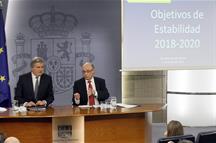 Pool Moncloa/J.M. CuadradoOn another note, the Minister for the Treasury and Public Function reported on the modification by the Council of the Ministers to the deficit targets of public sector agents for the years 2018 and 2019. This modification had been approved by the Fiscal and Financial Policy Council at its meeting earlier on Friday morning.
Pool Moncloa/J.M. CuadradoOn another note, the Minister for the Treasury and Public Function reported on the modification by the Council of the Ministers to the deficit targets of public sector agents for the years 2018 and 2019. This modification had been approved by the Fiscal and Financial Policy Council at its meeting earlier on Friday morning.
The government agreed to increase the deficit target of the regional governments by one tenth, which now stands at 0.4% of the Gross Domestic Product (GDP) in 2018 and 0.1% in 2019. This increase corresponds to a reduction in the deficit target of the Social Security system, which falls to 1.1% of GDP in 2018 and 0.9% on 2019.
This change, pointed out Cristóbal Montoro, is partly in response to a political negotiation, since the proposal requires sufficient support in the Lower House of Parliament. It also responds to the upward trend in the number of National Insurance contributors, which rose last month by 3.8%.
The Minister for the Treasury stressed that the limit on non-financial State spending for 2018 has not been modified in respect of that which was approved on 3 July. Furthermore, he expressed his conviction that the ceiling on spending will prosper in its passage through the Lower House of Parliament on Tuesday, 11 July. After the bill being passed through the Upper House the following day, he pointed out, "the door will be open for drawing up the General State Budget for 2018".
Energy transition
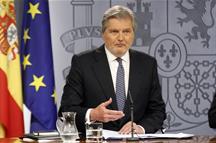 Pool Moncloa/J.M. CuadradoThe Council of Ministers approved the creation of a committee of experts to draft a report on the different energy transition scenarios. It will be comprised of 14 members: four appointed by the government, one by each parliamentary group and three by the trade unions (UGT, CC OO and CEOE).
Pool Moncloa/J.M. CuadradoThe Council of Ministers approved the creation of a committee of experts to draft a report on the different energy transition scenarios. It will be comprised of 14 members: four appointed by the government, one by each parliamentary group and three by the trade unions (UGT, CC OO and CEOE).
The Minister for Education, Culture and Sport and Government Spokesperson, Íñigo Méndez de Vigo, specified that the experts have six months to present the document, which will contain alternatives that analyse the combination of different energy sources (nuclear, hydraulic, coal-fired, combined-cycle and renewable source) within the framework of an efficient, sustainable and low-carbon energy transition. They will also evaluate the degree of penetration of renewable energies in relation to the targets agreed by Spain with the European Union.
Stevedore agreement
The Minister for Employment and Social Security, Fátima Báñez, reported to the Council of Ministers' meeting that the stevedores' trade union and the employer's association have recorded the agreement reached on 29 June to maintain employment in the stevedore sector with her department.
Íñigo Méndez de Vigo pointed out that the document provides for the two points that "the government was strongly committed to", and that comply with the ruling handed down by the Court of Justice of the European Union and that those issues that cannot be subject to regulation will be agreed between the trade unions and the employer's association within the framework of the collective bargaining agreement.
The minister expressed the government's satisfaction at the conclusion of the conflict. "This framework agreement maintains the jobs and ensures the competitiveness of the enterprise".
Catalonia
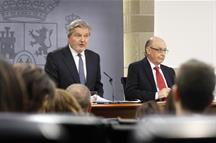 Pool Moncloa/J.M. CuadradoThe Government Spokesperson highlighted that at the meeting held between the President of the Government, Mariano Rajoy, and the General Secretary of the PSOE, [Spanish Socialist Workers' Party], Pedro Sánchez, on Thursday, 6 July, they agreed that "the referendum on self-determination is absolutely unacceptable because it is an attack on the national sovereignty and the Constitution".
Pool Moncloa/J.M. CuadradoThe Government Spokesperson highlighted that at the meeting held between the President of the Government, Mariano Rajoy, and the General Secretary of the PSOE, [Spanish Socialist Workers' Party], Pedro Sánchez, on Thursday, 6 July, they agreed that "the referendum on self-determination is absolutely unacceptable because it is an attack on the national sovereignty and the Constitution".
On this issue, Íñigo Méndez de Vigo warned that the so-called laws of the referendum on self-determination and transience presented in the Regional Parliament of Catalonia and in a theatre in Catalonia "lack the most basic legal guarantees".
The minister recalled that these are merely documents, which have not even been approved by the Regional Government of Catalonia, or submitted to Parliament, or signed by any political leader, and hence lack any authority. In his opinion, they do not seek "to break up Spain but to break up Catalonia". "The secessionists wish to subject the majority of the people of Catalonia, this majority that believes in the law, in the democratic institutions, and in the social and political order, to the dictates of a minority that have lost the plot", because they do not even listen to their own institutions.
In this regard, Íñigo Méndez de Vigo recalled that the legal counsel of the Regional Parliament of Catalonia said that approving budgetary items for the referendum was illegal and that the Constitutional Court annulled them. He also underlined that on Thursday the Statutory Guarantee Council unanimously rejected the reform of the regulation on the fast-track decoupling of the so-called laws on breaking away from the State.
The government, added the Government Spokesperson, calls for rational conduct because a referendum on self-determination is not authorised in the Constitution and as such cannot be held. "There are no ballot boxes, no electoral roll, no electoral board, and public servants cannot take part in it, and hence, the rule on neutrality and participation of the electoral authorities cannot exist".
In response to questions from journalists on the measures that can be adopted in order for the referendum to not be held, including the application of Article 155 of the Spanish Constitution, Íñigo Méndez de Vigo answered that these will "depend upon what the secessionists do". On this point, he added that the government will "be delighted" to study the initiatives that the PSOE has announced, as well as those of any other parliamentary group.
Purchasing power of salaries
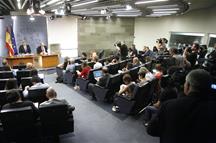 Pool Moncloa/J.M. CuadradoIn his assessment of the week's affairs, Íñigo Méndez de Vigo highlighted the positive employment and National Insurance contributor figures for the month of June, as well as the upward revision of the growth forecasts of the Spanish economy. In his opinion, this is "integrating growth that leads towards greater social cohesion because it is sustainable and continuous".
Pool Moncloa/J.M. CuadradoIn his assessment of the week's affairs, Íñigo Méndez de Vigo highlighted the positive employment and National Insurance contributor figures for the month of June, as well as the upward revision of the growth forecasts of the Spanish economy. In his opinion, this is "integrating growth that leads towards greater social cohesion because it is sustainable and continuous".
He also referred to the Country RepTrack Report, drafted by the Reputation Institute which evaluates the reputation of the 55 countries with the largest GDP in the world. Spain has jumped four places on 2016 and now stands in 13th place in terms of countries with the highest reputation, ahead of such countries as Germany, France, Great Britain and Italy. The two variables that score the highest are the perception of the economic environment, which rose to almost 4% and social well-being, which stood at 3.2%.
The minister pointed out that Spain "has not only recovered the values of confidence and international prestige of prior to the start of the crisis in 2009, but has easily exceeded them to now stand at the highest level on record".
After outlining these figures, Íñigo Méndez de Vigo confirmed that the government estimates that "the time has come, because the figures allow this, to also recover the purchasing power of salaries", as announced by the Minister for Employment and Social Security, Fátima Báñez, on Tuesday, 4 July.
Current affairs
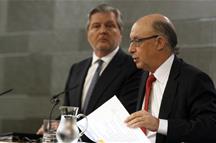 Pool Moncloa/J.M. CuadradoAs regards raising salaries for public workers, the Minister for the Treasury and Public Function explained that "we will start wage negotiations whereby the reference will not necessarily be the Consumer Price Index - CPI", but rather economic growth; this will be extended to three financial years, and will take into consideration the "driver effect of the economy", as a result of the activity of public workers, "which should be reflected in their payslips".
Pool Moncloa/J.M. CuadradoAs regards raising salaries for public workers, the Minister for the Treasury and Public Function explained that "we will start wage negotiations whereby the reference will not necessarily be the Consumer Price Index - CPI", but rather economic growth; this will be extended to three financial years, and will take into consideration the "driver effect of the economy", as a result of the activity of public workers, "which should be reflected in their payslips".
Cristóbal Montoro announced some aspects of the reduction in Personal Income Tax (Spanish acronym: IRPF) contained in the General State Budget for 2018. "This will apply to lower incomes that are not presently exempt from this tax", the thresholds for paying this tax will be raised to 14,000 euros per annum, it will provide for deductions in the quota for persons with disabilities, it will improve the treatment for new-borns, care for the elderly and those who have the elderly in their care. These measures, he assessed, could affect some 20 million taxpayers.





